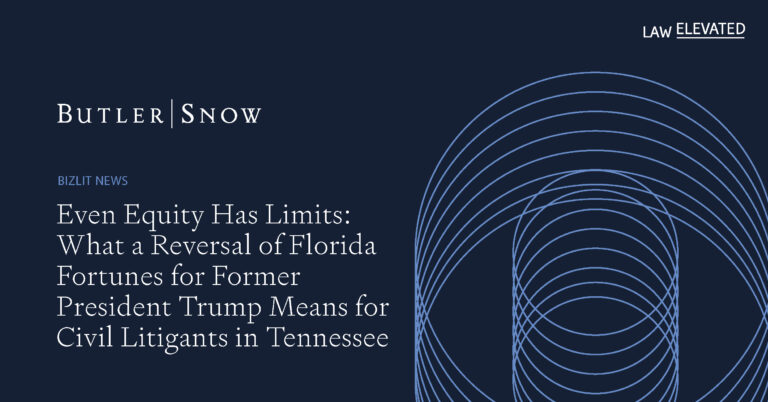*A recent federal appeals court’s decision to reverse the stoppage of a criminal investigation in Florida has implications for civil litigants in Tennessee.*
On December 1, 2022, the U.S. Court of Appeals for the Eleventh Circuit vacated a Florida federal district court’s decision to block the use of documents in a criminal investigation. Former President Trump had sued the federal government and sought an injunction after the FBI executed a search warrant and seized several documents at his home. The district court granted the injunction, invoking “equitable jurisdiction,” and appointed a special master to review the seized documents for attorney-client and Executive privilege before the government could use them.
In vacating the district court’s decision, the appellate court first observed that “[e]xercises of equitable jurisdiction . . . should be ‘exceptional’ and ‘anomalous.’” It then proceeded to mark the contours of such exercises, observing that federal courts wield limited, rather than general, jurisdiction and therefore it must be “presumed that a cause [of action] lies outside’” their authority. Concluding that none of the relevant factors supported equitable jurisdiction and that the district court had abused its discretion, the appellate court ordered the dismissal of the entire case.
That outcome has more to do with civil litigants in Tennessee than you might think. For starters, Tennessee is one of a handful of states that maintain separate civil courts of law and equity.[1] The judges of Tennessee’s equity courts, called Chancellors, possess the extraordinary power, dating back to the colonial era,[2] to “modify the application of strict legal rules and adapt relief to the circumstances of individual cases.”
But that extraordinary power is not without limits. On the contrary, its most common expression—the injunction—is freighted with requirements that simply do not exist for legal relief.[3] Even a temporary injunction “shall be indorsed with the date and hour of issuance” and “shall set forth findings of fact and conclusions of law which constitute the grounds of its action.” Tenn. R. Civ. P. 65.04(4), (6). Long-standing Tennessee precedent prescribes a four-factor test that must be met even to invoke it.[4] And other expressions of equitable authority, such as the suspension of a final judgment, must meet even more exacting standards. See, e.g., Tenn. R. Civ. P. 60.02.[5]
The Eleventh Circuit described equitable jurisdiction as “exceptional” and “anomalous” in addressing a Florida federal district court and a criminal investigation. Yet that description echoes Tennessee’s understanding that equity in civil litigation “affords relief in the most extreme, unique, exceptional, or extraordinary circumstances.”[6] Litigants before Tennessee Chancellors should thus take heed: Even equity has limits.
[1] Two other states that do so are Mississippi and Delaware.
[2] Compare, e.g., “Chancery Courts,” About the Trial Courts, https://www.tncourts.gov/courts/circuit-criminal-chancery-courts/about (last visited Dec. 5, 2022) (“Chancery Courts are courts of equity that are based on the English system in which the chancellor acted as the ‘King’s conscience.’”), with “Jurisdiction of the Court of Chancery,” Court of Chancery, https://courts.delaware.gov/chancery/jurisdiction.aspx (last visited Dec. 5, 2022) (“The general equity jurisdiction of the Court is measured in terms of the general equity jurisdiction of the High Court of Chancery of Great Britain as it existed prior to the separation of the American colonies.”).
[3] See, e.g., Tenn. R. Civ. P. 65.02 (requiring that every injunction “shall be specific in terms and shall describe in reasonable detail . . . the act restrained or enjoined”); 65.03 (requiring that injunctions issued without notice to the adverse party rest on sworn facts that “clearly show . . . immediate and irreparable injury, loss, or damage . . . to the applicant”); and 65.05 (requiring a bond “for the payment of such costs and damages as may be . . . suffered by any person . . . wrongfully restrained”).
[4] S. Cent. Tenn. R.R. Auth. v. Harakas, 44 S.W.3d 912, 919 n. 6 (Tenn. Ct. App. 2000) (“The most common description of the standard for preliminary injunction in federal and state courts is a four-factor test: (1) the threat of irreparable harm to plaintiff if the injunction is not granted; (2) the balance between this harm and the injury that granting the injunction would inflict on the defendant; (3) the probability that plaintiff will succeed on the merits; and (4) the public interest” (internal citation and quotation marks omitted).); cf., e.g., Nashville, C. & St. L. Ry. v. R.R. & Pub. Utilities Comm’n, 32 S.W.2d 1043, 1045 (Tenn. 1930) (“A court of equity will not award an injunction . . . merely to relieve the fears or apprehensions of an applicant.”).
[5] See Hussey v. Woods, 538 S.W.3d 476, (Tenn. 2013) (explaining that Rule 60.02(5) “affords [equitable] relief in the most extreme, unique, exceptional, or extraordinary circumstances”).
[6] See, supra, note 5 and accompanying text.
